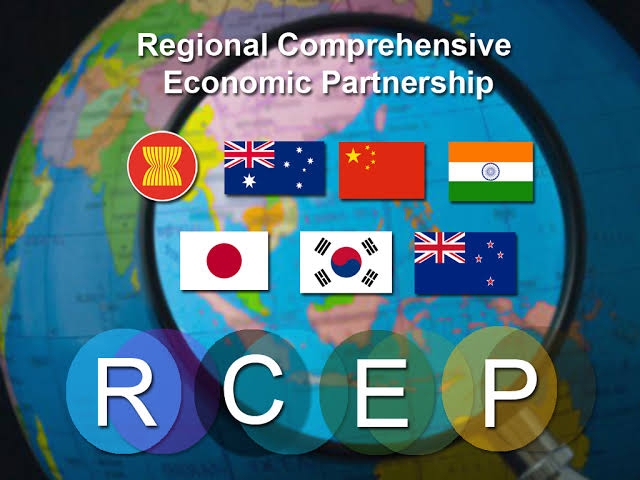Asked by
Birds of the sky (2 Golds)
Tuesday, 01 Dec 2020, 08:26 PM
at (Jobs
Job Preparation)
|
|
|
|
|
Answer(s):
"Regional Comprehensive EconomicP artnership (RCEP)" On 15 November 2020, a new regional agreement called the Regional Comprehensive Economic Partnership (RCEP) was signed.The agreement has been dubbed as the world's largest trade alliance and the world's largest free trade agreement (FTA).The treaty is signed by 15 countries of Southeast Asia and the Pacific region.These countries account for about 30 percent of the world's gross domestic product and about one-third of the world's population. The agreement is very important from the geo-economic-political point of view. At a time, when the global economy is now facing unprecedented challenges due to the Covid-19 pendemic , the RCEP agreement is promising for its member countries. But the trade deal is seen as a step towards a new world order, in which the Asian region will dominate. The immediate impact of RCEP in Bangladesh : Firstly, The immediate impact of RCEP is low in Bangladesh. From the nature of Bangladesh's exports to the RCEP countries, it can be inferred that Bangladesh will not be in a very worrying situation at the moment. Bangladesh, as a Least Developed Country (LDC), enjoys a variety of priority benefits in a number of RCEP countries, including Australia, China, Japan, New Zealand, South Korea and Thailand. At present, more than 80 percent of Bangladesh's total exports to the RCEP region go to those countries. Secondly, Another point is that it takes a long time to reap the benefits of such a multilateral trade agreement. In fact, in RCEP countries, tariffs will be reduced by 90 percent for two decades. Experts say it will take 2021 to complete the approval process. So Bangladesh will have some time to fix its strategy However, Bangladesh has enough reasons to worry. Firstly, Least Developed Countries (LDCs) such as Laos and Myanmar (who are also member of RCEP) who qualified to leave the Least Developed Countries with Bangladesh in 2018. By becoming a partner in this new trade agreement, these least developed countries will continue to enjoy preferential market access even after becoming a developing country, which Bangladesh will not get. From all these countries, Bangladesh will be able to enjoy the benefits due to the least developed countries till 2027. But then you will not get that opportunity. Therefore, if such a multilateral agreement is left out, Bangladesh's exports will suffer in the medium and long term. Secondly, in case of garment export, Vietnam is one the prime competitor of Bangladesh to the global market. Although Bangladesh is getting duty-free access to the European market, this opportunity will no longer exist for Bangladesh after the transition to developing countries. But Vietnam has signed a bilateral free trade agreement with the European Union (EU). This will give Vietnam a preferential advantage in the European market. In addition, Vietnam's preferential market access is greatly enhanced by its affiliation with the RCEP, the EU and the TPP. So Bangladesh will be in fierce competition as a result. Thirdly, The impact of such mega trade agreements is multifaceted. It creates investment opportunities, strengthens the supply chain. The members of RCEP will get preferential tariff benefits on products through many flexible ‘Rules of Origin’. It will also attract investment among RCEP member countries and these countries increase their exports through preferential trade as well. As a result, Bangladesh or any other non-RCEP country will not be an attractive destination for investors. Bangladesh's preparation for the new reality - The risks to Bangladesh from RCEP and other regional trade agreements can be greatly reduced through active participation in free trade agreements or PTA. As a member of multiple FTAs including BIMSTEC, Bangladesh can take effective steps to benefit from the integration of regional trade. Fear of losing the export markets in that reagion , it is being said that Bangladesh should join in the Regional Comprehensive Economic Partnership (RCEP). However, as a prerequisite for this, Bangladesh has to prepare. And its impact on the domestic market must be properly scrutinized before it can be applied to a agremeent like RCEP. This agreement will require high quality activities and services for trade and investment. The agreement also covers/includes intellectual property rights, e-commerce, telecommunications and financial and professional services. In order to participate in these agreements, Bangladesh needs to implement various policies and economic reforms. Skills need to be enhanced to compete in a tough trade system. Such preparations will also help in smooth and sustainable transition from the list of least developed countries to developing countries. Answered by Birds of the sky (2 Golds) Tuesday, 01 Dec 2020, 08:28 PM |
